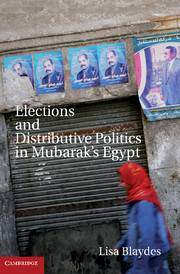Book contents
- Frontmatter
- Contents
- List of Figures
- List of Tables
- Acknowledgments
- 1 Introduction
- 2 Political and Economic Change since 1952
- 3 Elections and Elite Management
- 4 The Politics of Infrastructure Provision
- 5 Electoral Budget Cycles and Economic Opportunism
- 6 Vote Buying, Turnout, and Spoiled Ballots
- 7 Elections and Elite Corruption
- 8 Elections and the Muslim Brotherhood
- 9 Liberal Intellectuals and the Demand for Democratic Change
- 10 Foreign Pressure and Institutional Change
- 11 Egypt in Comparative Perspective
- 12 Conclusion
- Bibliography
- Index
6 - Vote Buying, Turnout, and Spoiled Ballots
Published online by Cambridge University Press: 04 February 2011
- Frontmatter
- Contents
- List of Figures
- List of Tables
- Acknowledgments
- 1 Introduction
- 2 Political and Economic Change since 1952
- 3 Elections and Elite Management
- 4 The Politics of Infrastructure Provision
- 5 Electoral Budget Cycles and Economic Opportunism
- 6 Vote Buying, Turnout, and Spoiled Ballots
- 7 Elections and Elite Corruption
- 8 Elections and the Muslim Brotherhood
- 9 Liberal Intellectuals and the Demand for Democratic Change
- 10 Foreign Pressure and Institutional Change
- 11 Egypt in Comparative Perspective
- 12 Conclusion
- Bibliography
- Index
Summary
Authoritarian elections are as varied as the regimes that hold them. Within a single nondemocratic country, elections can take place at various levels of competitiveness and mobilizing different constituencies. And although authoritarian elections rarely offer the opportunity to change the existing regime, these elections can have politically important results. Even acts of voter abstention or ballot nullification can provide meaningful signals of discontent and voter preference. Studies of voting in the Soviet Union, for example, suggest that nonvoting was seen as an act of protest in which relatively well-educated individuals consciously decided to ignore mandatory voting laws or spoil their ballots in a country where there was no real choice between candidates (Karklins 1986; Roeder 1989). In China, voters participating in local elections tend to be individuals seeking to punish corrupt bureaucrats (Shi 1999). In Brazil, under military rule, compulsory voting led to high turnout, but blank and spoiled ballots have been interpreted as an indication of dissatisfaction with authoritarian governance (Powers and Roberts 1995). In all of these cases, voters had political beliefs and preferences that led them to engage in the act (or nonact) of voting, and the submission of a valid or spoiled ballot often was a representation of preference. These examples also suggest that, in a wide range of authoritarian countries, there are avenues of limited political expression, some of which include voter choice, and perhaps even forms of accountability.
- Type
- Chapter
- Information
- Elections and Distributive Politics in Mubarak’s Egypt , pp. 100 - 124Publisher: Cambridge University PressPrint publication year: 2010

